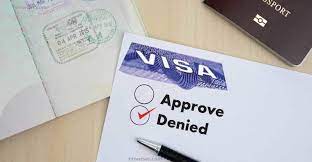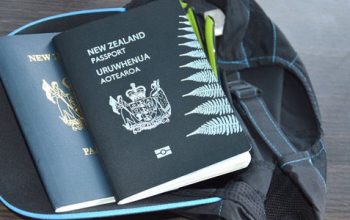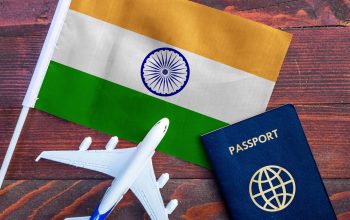Are you looking to expand your business into the vibrant and dynamic market of India? If so, you’ll need to secure a business visa to make that dream a reality. Navigating the process of obtaining an Indian business visa can be daunting, but fear not – we’re here to guide you through the ins and outs of this essential step in global entrepreneurship. From application requirements to processing times, we’ve got all the information you need to successfully obtain your Indian business visa and take your enterprise to new heights. Let’s dive in! Indian Visa for Business
Introduction to Indian Business Visa
An Indian Business Visa is a type of visa that allows foreign nationals to enter India for business-related purposes. It is issued by the Indian government and can be obtained through an online application process or by visiting an Indian embassy or consulate in the applicant’s home country.
This visa is essential for those who are planning to conduct business activities such as attending conferences, meetings with potential clients, or exploring investment opportunities in India. It is valid for a period of up to 1 year and can be extended while staying in the country.
To apply for an Indian Business Visa, one must have a valid passport with at least six months of remaining validity and two blank pages for visa stamps. The applicant must also provide proof of their purpose of travel, such as an invitation letter from an Indian company or organization, along with other necessary documents.
One crucial requirement for obtaining an Indian Business Visa is having a sponsor in India. This could be the company or organization that has invited the applicant to conduct business activities in the country. The sponsor must provide a letter stating their relationship with the applicant and their willingness to take responsibility during their stay in India. Indian Visa for Medical Visit
Additionally, applicants must also provide evidence of sufficient funds to support themselves during their stay in India. This could include bank statements, credit card statements, or any other financial documents showing that they can cover their expenses while conducting business activities.
The application process for an Indian Business Visa can vary depending on the country from which it is being applied. Some countries have online applications available, while others may require applicants to visit an embassy or consulate in person. It is essential to check the specific requirements and procedures before starting the application process.
Once all necessary documents have been submitted and processed, applicants will receive either an electronic visa (e-visa) via email or a physical visa stamped into their passport at their designated port of entry into India.
It should be noted that having an Indian Business Visa does not guarantee entry into the country. Immigration officers at the port of entry have the final say in allowing individuals to enter India, and they may deny entry if they deem the purpose of travel to be different from what is stated on the visa application.
An Indian Business Visa is a necessary and valuable document for those planning to conduct business activities in India. It is essential to carefully follow all requirements and procedures to ensure a smooth and successful application process.
Different Types of Indian Business Visas
India is a popular destination for business travelers due to its growing economy and expanding global market. As such, the Indian government offers various types of business visas to cater to the diverse needs of foreign businessmen. In this section, we will discuss the different types of Indian business visas and their specific requirements.
1. Business Visa (B-1): This type of visa is issued to individuals who wish to visit India for short-term business activities such as attending meetings, conferences, or exploring potential investment opportunities. The maximum duration for this visa is 180 days with a single or multiple entries.
2. Employment Visa (E): For those who intend to work in India, an employment visa is required. This visa is granted to highly skilled professionals, managers, or executives who have been offered employment by an Indian company or organization.
3. Intern Visa (I): An intern visa is designed for foreign nationals who wish to undergo internship programs in Indian companies or organizations for a maximum period of one year.
4. Project Visa (P): This type of visa is issued to individuals coming to India on project assignments that require specialized skills not available in the domestic market.
5. Conference Visa (C): A conference visa allows foreigners traveling to India for international events organized by government bodies/organizations/PSUs/universities/societies/an autonomous body under the Central/State Government departments/ministries etc.,to attend such events without permission from any other authority.
6. Film Shooting Visa: As the name suggests, this type of visa is granted to foreign filmmakers and crew members visiting India solely for film shooting purposes.
7.Volunteer Visa: Individuals who want to participate in short term volunteer work in NGOs registered in India can apply for a volunteer visa which has validity up-to six months only but can be extended during your stay upon fulfilling certain conditions later on .
8.Journalist Visa: Journalists traveling on behalf of print/electronic media to India for news coverage, reporting, or filming documentaries need a journalist visa which is generally granted for three months with a single entry.
Understanding the different types of Indian business visas and their specific requirements is crucial in obtaining the right visa for your visit. It is recommended to carefully review the eligibility criteria and documents needed before applying to ensure a smooth and hassle-free application process. With the proper visa in hand, you can confidently explore the vibrant business landscape of India and tap into its vast potential.
Eligibility Criteria for Business Visa:
Obtaining a business visa for India can be a lengthy and complicated process, but knowing the eligibility criteria beforehand can help make the application process smoother. In this section, we will discuss the various factors that determine whether an individual is eligible for an Indian business visa.
1. Purpose of Travel:
The first and most important factor in determining eligibility for a business visa is the purpose of travel. As the name suggests, this type of visa is specifically meant for individuals traveling to India for business-related activities such as attending meetings, conferences, or exploring potential business opportunities. If your purpose of travel does not fall under these categories, you may need to apply for a different type of visa.
2. Valid Passport:
Before applying for a business visa, it is essential to ensure that you have a valid passport with at least six months’ validity from the date of entry into India. The passport must also have at least two blank pages for immigration stamps.
3. Supporting Documents:
In addition to a valid passport, applicants must provide supporting documents such as invitation letters from Indian companies or organizations they will be visiting, proof of registration as a company or business entity in their home country, and financial statements showing sufficient funds to cover expenses during their stay in India.
4. Letter of Introduction:
Applicants are also required to provide a letter of introduction from their employer or sponsoring company stating the nature and duration of their visit to India and confirming that all expenses will be covered by them.
5. Duration of Stay:
The duration of stay allowed on an Indian business visa varies depending on the applicant’s nationality and other factors such as the purpose of travel and supporting documents provided. Most visas are issued for 6 months multiple entries with each stay not exceeding 180 days.
6. Background Check:
All applicants are subject to background checks by Indian authorities before being granted a business visa. Any past criminal records or security issues may result in a visa denial.
7. Availability of Business Visa in Home Country:
It is essential to note that the availability of business visas may vary depending on the applicant’s home country. Some countries have stricter requirements and longer processing times for Indian visas, so it is advisable to check with the nearest Indian embassy or consulate for specific information.
Obtaining an Indian business visa requires careful consideration of the eligibility criteria mentioned above. It is essential to ensure that all necessary documents are provided and that your purpose of travel aligns with the requirements for a business visa. By fulfilling these criteria, you can increase your chances of getting your business visa approved and embark on your journey to India hassle-free.
Common Mistakes to Avoid When Applying for an Indian Business Visa
Applying for an Indian business visa can be a lengthy and complex process, with many requirements and guidelines to follow. It is important to carefully prepare and submit your application in order to avoid any delays or rejections. In this section, we will discuss some common mistakes that applicants make when applying for an Indian business visa, and how you can avoid them.
1. Incomplete or Inaccurate Information:
One of the most common mistakes made by applicants is providing incomplete or inaccurate information on their application form. This could include missing contact details, incorrect dates of travel, or failure to properly fill out all sections of the form. To avoid this mistake, it is crucial to carefully read and understand all instructions provided by the Indian embassy or consulate before filling out your application. Double-check all information before submitting it to ensure accuracy.
2. Wrong Visa Category:
Another frequent error made by applicants is choosing the wrong visa category for their business trip. There are different types of visas available for business purposes, such as a Business e-Visa or a Business Employment Visa. Each category has its own set of requirements and eligibility criteria. Make sure you choose the correct category according to the purpose of your visit and provide all necessary documents accordingly.
3. Insufficient Supporting Documents:
Supporting documents play a crucial role in determining the outcome of your visa application. Many applicants make the mistake of not providing enough supporting documents or providing irrelevant ones which do not fulfill the requirements set by the embassy/consulate. It is essential to thoroughly review the document checklist provided by the Indian authorities and gather all necessary documents before submitting your application.
4 . Failure to Meet Financial Requirements:
Indian business visas require applicants to provide proof of sufficient funds for their stay in India, including expenses such as accommodation, transportation, meals etc.. One common mistake made by applicants is failing to meet these financial requirements which leads to rejection of their application even if they fulfill all other criteria. Make sure to provide bank statements, income tax returns and other relevant documents to prove your financial stability.
5. Lack of Consistency:
Inconsistencies in information provided on different forms or documents can raise red flags for the visa authorities and result in rejection of your application. It is important to ensure that all information provided on your application form, supporting documents, and any other forms such as invitation letters are consistent and accurate.
It is crucial to carefully review all instructions and requirements before applying for an Indian business visa to avoid these common mistakes. Any errors or omissions can lead to delays or rejections which can be costly and time-consuming. By avoiding these mistakes, you can increase the chances of a successful visa application and have a smooth travel experience for your business trip in India.



